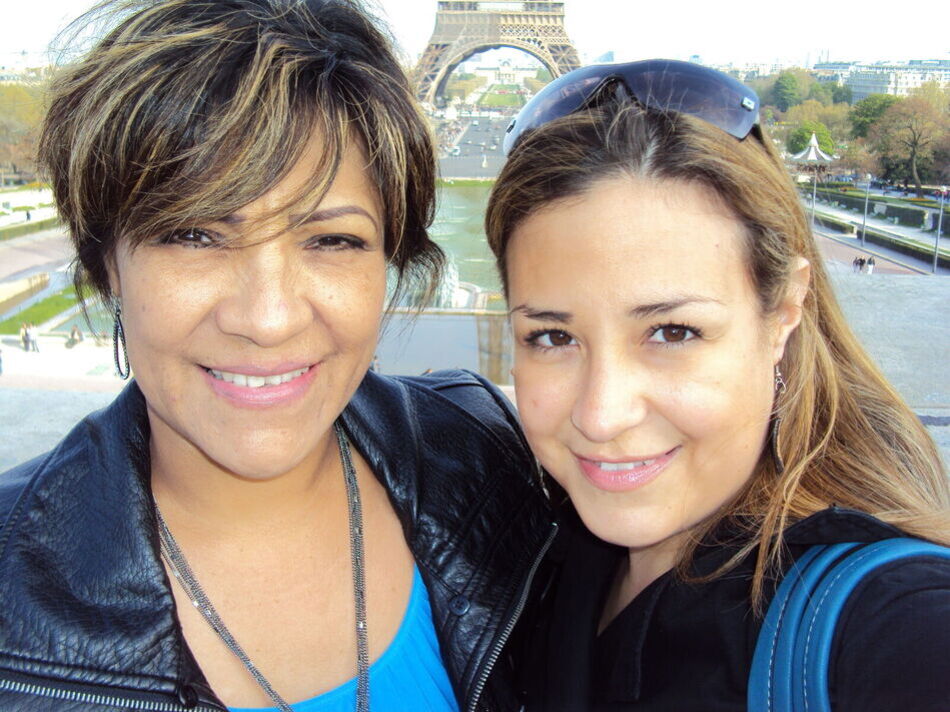Woman on the Rise: Meet MNA’s Mariana Martinez
- Posted On
- Category
Being a woman in a man’s world isn’t easy. Being a woman of color is even harder, but Mariana Martinez is among the trailblazing women helping to break down barriers. She is currently the Director of Civic Engagement Initiatives at Michigan Nonprofit Association and is leading MNA’s Redistricting Initiative.
I can think of a slew of adjectives to describe Mariana: passionate, fierce, reliable, enthusiastic, tenacious, ambitious, and hardworking. It’s her bright smile that lights up the room, and the way she speaks with conviction and passion. If you’re around her for any length of time, she will eventually make you smile because her laughter is quite contagious. I sat down with Mariana for this interview where we discussed everything from her childhood to her three nationalities, racism, privilege, and her fierce love for the city of Detroit.
Tell me about yourself. What molded you into this phenomenal woman you are now?
I was born in Mexico and moved to the United States when I was 15. I had a normal childhood—middle class, comfortable, Catholic school,etc. But when my parents divorced, things changed. My dad was not a good person and left us. My mom worked a lot of odd jobs. She found an opportunity to move to the United States (I had a brother here in the US), and so we moved to Connecticut.
What year was that?
1996. I'm in a new country, I’m a teenager, those awkward years, and learning a new language. I was like, I’m going back to Mexico (laughs). But I kept going. I went to school and I from graduated high school. This was something my mother instilled in me- the importance of education. She said, “I’m going to provide you with everything, give you the support so that you can focus on school.”
When you arrived in the US, did you know any English?
No, no.
Where did you learn to speak English?
At school. I was thrown into school.
High school is one of the most stressful times of our lives as teenagers and you didn’t know what the other kids were saying?
No. But I would say at about 3 months after moving, I started making out phrases. By six months, I was having a conversation. But you know, that really did hurt me because it hurt my education and it put me behind in certain areas, notably math. When it comes to math, you think of it in your native language and the way math is taught, it’s different. I remember a teacher called me out to give an answer (in math class), and I was so intimidated and not because of math itself, but because of the language barrier. He put me behind a class which led to me really being behind in high school, and therefore in college. When I graduated, I had to take makeup classes for math because I was behind. That made me resilient. I was so frustrated, but I still wanted to go to school and prove to myself that I could. I was like- how am I going to make it to college if I have to take all these classes that I should not have had to take. In hindsight, this taught me about perseverance. I had to work harder to make up for lost time. However, I did catch up and ended up loving statistics and even earned the respect from one of the toughest professors in the psychology program. Professionally, I have managed the operations of many organizations in all three sectors (for-profit, nonprofit, philanthropy) and even government internationally. I’d say I’ve proven that you don’t need to have a calculator in your head to be successful.
Language was a barrier for you. Was ESL (English as a Second Language program) offered?
I attended Danbury High School in Connecticut for a few months. They had a great ESL program, and I took full advantage of it. I had ESL classes in the morning and then I would go to my classes, and then back to ESL classes at the end of the day. I imagine they saw my progress because they assigned me with a tutor. Unfortunately, that was only for 3 months because my mom got married and we moved to a different school where we were like, the diversity. My new school was Brookfield High School and there was no ESL program, it was “full immersion” for me.
You said you and your brother were basically the only minorities in your new school?
In that school, I definitely received racism. I would hear, “Oh, you’re an immigrant.” Or “You’re the good kind of immigrant.” Once I was called spick. At that point I didn’t even know what it meant. One of my friends told my boyfriend, “Do you know what they called her?” He got so upset that he grabbed the guy (who called me a spick) and lifted him up and was like repeat what you just said?! I will never forget that. (laughs) The kid definitely learned a lesson. Also, a friend of my boyfriend at the time, asked him if I was dating him for the “papers”. What kind of question is that when you’re 17?! Yeah, microaggressions throughout school for sure.
Moving on to college- explain that time period.
I knew that if I wanted to go to college, I was going to have to pay for it. So, I started working. I bought my car, my first cell phone and saved for the first semester of college. I got myself to college. I started part-time and I worked various jobs. I started working in the hospitality business because I knew that it was going to give me the flexibility to be able to work and to go to school. I kept getting promoted to the point that when I left college, I had a job offer of opening a hotel and I was like- is this what I want to do? I had studied psychology and I wanted to help others. But I ended up taking the job.
You were living abroad at this time correct?
While I was still in college, I went to live in Spain. I was there for about six months and that is where I met my ex-husband which changed my life. We were together for about a year but living apart. I ended up moving to France to follow love. I was doing this again. I was like, I can’t believe I did this in Mexico and now I have to do it again (relocate and learn a new language). I fought for so much right? I graduated, got this amazing job and here I am leaving it for love.

How did you adapt to living in yet another new country?
I did the same things that I did when I was in the US. I adapted. I focused on learning French because I knew that I didn’t want to take a job teaching English. A lot of Americans who lived in France at that time were teaching English, and I was like no, that’s not what I want to do. So, I studied French and focused on that.
Why the move from France? Why move to Michigan? How did you choose Detroit?
We were living in Paris which is an amazing city that has its ups and downs. But we were in a really small apartment and I was ready for more space. I told my ex-husband, I know what it’s like to live in the United States and France, but you don’t. Would you be willing to move to the US? He was super excited and so we started looking. It was important for me that he found a job (which he didn’t have a problem.) The world opens to white men. He’s an engineer and he was able to find a job (snaps fingers) like that. He found the job in Detroit and that is why we moved to Detroit. I had no connections in Michigan, but by living in Michigan we were already closer to my family. We visited the area for like 5 days (prior to moving) to figure out where we were going to live. A colleague of my ex-husband showed us a map of the city and Eight Mile and he was like from here down, it’s a dump. He said Detroit was horrible. I remember thinking how can somebody say that? I’m sure Detroit has its challenges, but I am also sure it has beautiful parts. I just couldn’t believe people would express themselves that way about their region.
But you fell in love with the city?
I fell in love with Detroit in ways that I never imagined that I would. When we were married, we lived in the suburbs but when we got divorced which was in 2017, I was like, what am I doing in the suburbs? (laughs) So, I moved to Detroit. My friends were like, “what are you doing?” (laughs) The resilience of the people (of Detroit) I love the pride. I just felt like Detroit opened for me in such a crucial moment in my life which was when I was getting divorced. It makes me cry. I love Detroiters. The energy from them is so welcoming. Detroiters have had to fight for so many years--many battles and they’re resilient and I was able to connect through that pain. I’m sharing your struggle.


How many languages do you speak?
Three. I understand five, but I speak three fluently: French, English and Spanish. I have three nationalities as well. I’m American, Mexican, and French. French is a humongous part of me. When I hear a person speak French, I feel the same feelings as when I hear someone speak Spanish. I feel the same connection. It was my country. I made friends for life. I am the godmother for some of my friends back there. My cousin still lives in Spain. Europe is definitely home.
What is your favorite food out of the three?
Mexican by far. That’s my heart. (laughs)
Detroit is known for its coney dogs, pizza. Do you love all of that stuff?
Yes! Absolutely. One of the things when you’re good at languages is the ability to adapt to different environments. I have a good ability to do that. I’m kind of like a chameleon. I fit right in. I love it. I observe the culture, the language. It happened to me in France and so, no surprise that it happened to me in Detroit too.

Why did you make the career switch from hospitality to the nonprofit sector?
I had been managing hotels for a long time and I went to school to study psychology. But something was missing. I felt like my purpose was not there. I love leading people and operations and budget and all of those things. When I moved back to Michigan, I went back to school. That was intense because I was managing a property and working like 60 hours a week. But I pursued a master’s degree in Public Administration with Nonprofit Management as a minor. And that’s when I made the jump. It was a transition working from the career that I had already built up in different countries and states. I had to start over basically. My resume screamed hotels and when I started out in the nonprofit sector people were like who are you? Long story short, people are going to recognize your accomplishments and make the connection. If you can manage a business, you can manage a nonprofit. I ended up working for amazing organizations.
Let’s circle back to the topic of being an immigrant, racism, and privilege. You mentioned being able to connect with others due to your struggle.
I have been told I don’t look like an immigrant.
What is an immigrant supposed to look like?
Exactly. Or I’ve been told that I don’t look Mexican or that I’m too fancy and too privileged. When we lived in Mexico and my parents got divorced, we moved to different places including my grandmother’s. My maternal family is very poor. Going to a private school in Mexico City is very different. I had to fight. In Mexico, there are different accents depending on the social class where you grew up, and I was evidently not from the hood. Do you know how many times I fought in school? Literally fought. I had to defend myself just for being me. That was an intense time.
Because your family was considered well off?
Yes. But then we lost everything, and my mom had to start over. I didn’t realize my own privilege or what I looked like. Those were intense times. My brother went through the same thing. He was getting beat too because they were like you talk differently. My grandmother didn’t even have a shower. I know where I come from. The fact that I grew up comfortably (in the beginning) didn’t mean I haven’t struggled. For me to understand the struggle and to be part of the fight doesn’t mean that you had to live poor.

Basically, you were punished for not having to worry about where your next meal was going to come from?
Yes. I feel like even now, people look at me and say you look fancy, you live in a nice place. But they don’t see the struggle behind the poverty I had to go through with my mother. When we left my dad’s house, I was wearing my school uniform. I wasn’t even wearing a sweater. My life changed from that day moving forward. I had to leave my school and we stayed at different people’s houses who were very poor. I saw poverty at levels that I had never seen poverty before. Life wakes you up and slaps you in the face. The fact that I choose to wear lipstick or that I look one way, or maybe my skin is lighter is a premise for some people to think that you are different. Microaggressions come from different places- not just from people who are racist against Mexicans. It’s also Mexicans themselves. I’ve been told that I don’t understand the struggles of immigrants. I’ve even been told that I act more like a colonist than Mexican. I am aware of my own privilege. If I get pulled over, I certainly don’t get treated in the same way perhaps as someone else with darker skin. I know where I come from and I know my struggle and I don’t have to explain it for people to understand. I am an immigrant and I’ve had struggles.
The space that I see you in today- I see confidence. A woman who is proud to be in her skin and her culture. I feel like you’re an empowered woman.
(Laughs) Thank you. I think it’s just knowing who you are. Of course, we’ve all doubted and asked who am I? I questioned it when I moved to the US. And when I moved to France, I thought should I change my name so that I sound more French. But then I said no. This is who I am. I’m going to be a Martinez..that’s my last name. And I will be who I am.
What is a favorite quote or saying that you like?
“Wherever you go, do your best- give your best.
What would you tell your younger self- that little girl who was in Mexico, or the teen who moved to a new country without knowing how to speak the language?
I would say don’t be afraid. Oftentimes, we doubt ourselves. We try to please others to be accepted. Don’t be afraid to say what you have to say.
In a span of 10-12 years, you learned English, learned French- lived in different places, adapted to each environment. You’re definitely not afraid- you bring great energy to MNA. (laughter)
Mariana Martinez will be speaking at MNA’s Monthly Member Connect this Wednesday, April 14, 2021 from 3-4 PM. To learn more about the work that is happening with MNA’s Redistricting Initiative, please join her. Register here: https://bit.ly/3dbdANX



